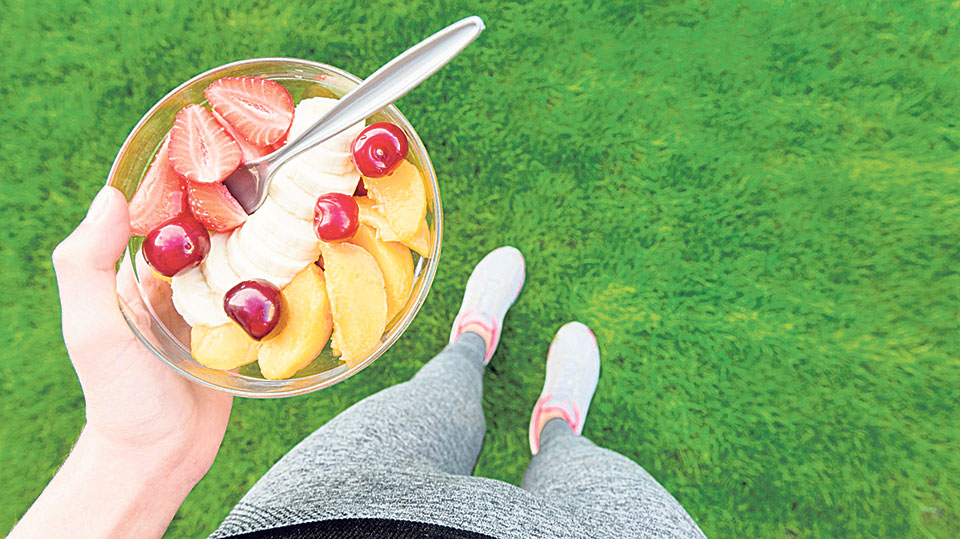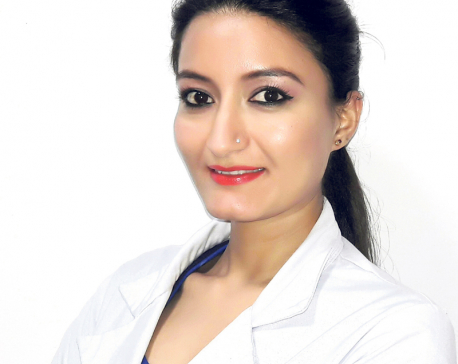
OR

Understanding the importance of pre- and post-workout meals
After making it a point to put yourself through grueling routines, you naturally want to see the desired results. Sweating it out for five to six times a week takes dedication so since you have already got that far with your determination, why not put in the effort to learn a few extra helpful tips that will help you reach your fitness goals?
As far as Niraamayae trainer, Rosy Pun, is concerned, educating her clients on the importance of pre- and post-workout meals is just as important as helping them around the gym. The trainer who is also a certified specialist in fitness nutrition, a course she took from ISSA, USA, believes this knowledge contributes to steadily moving ahead towards your desired weight. Here with The Week, she breaks it all down in the simplest form.
 First thing you need to know about pre- and post-workout meals is that the planned meals vary for each individual. “You determine your meals according to your gym goals,” says Pun.
First thing you need to know about pre- and post-workout meals is that the planned meals vary for each individual. “You determine your meals according to your gym goals,” says Pun.
When you get these meals right, it will help you with your workout performance, your protein production, fat reduction as well as muscle repair and recovery. Personally, she plans the pre- and post-workout meals as per the individual client’s activity level, workout duration, and fitness goals.
However, there are general things that everybody ought to know. “Basically, we have two types of clients coming to our gym,” she continues, “There are those who want to lose weight and those who want to gain weight.”
So, for those whose goal is weight loss
Pre-workout meals
According to Pun, “People in this category have to make sure they restrict their calories. Thus the pre- and post-workout meals have to be set accordingly.”
Many years ago, there used to be many instructors who insisted on doing your morning workouts in an empty stomach. Pun believes if possible this isn’t a bad idea because you are trying to be conscious of your calories. However, these days this isn’t a strict requirement either.
“For instance, even at the moment, I have a client who can come to the gym and easily workout with an empty stomach but I found out this doesn’t suit my other client,” she shares.
Apparently, the other client left lethargic and despite her wishes couldn’t push herself to perform her best. Since her goal was to lose weight she has to workout at certain intensity and if you aren’t able to do that, going to the gym becomes fruitless.
So, in this instance, Pun advised her client to first start with a cup of caffeinated drink or green tea, things that help increase your metabolism. In case a drink was still not enough, she recommends eating a fruit like apple or banana or strawberries before starting the workout. The client could also choose to eat one or two boiled egg whites or a piece of toast.
“Since her body’s glycogen level was low when she hadn’t eaten anything, she couldn’t push herself. After eating something before her workout though, she could put maximum effort to bring better results,” explains Pun.
Pun believes that fruits are the best options as pre-workout meals for those looking to lose weight because the fructose in them is quickly observed in the blood stream giving the person the required energy level without messing up her calorie intake.
Post workout meals
The motive here is to replenish the glycogen that you have burned during the intense workout sessions. Here we focus on muscle recovery.
But since your goal is weight loss, you must keep calorie restriction in mind. So first thing first, Pun recommends not eating a wholesome meal for 25 to 30 minutes after you finish exercising.
“When you work out you burn glucose. Once the glucose in your muscles is depleted, the body begins to burn the one found in your fat. It oxidizes the fat to get the required fuel to function,” explains Pun. She adds this is the reason why those seeking to lose weight are recommended to participate in longer duration exercise like aerobics and running on the treadmill.
Now if you eat immediately, your body won’t go into fat burning mode. So, wait a while. Choose to hydrate yourself in the meantime. Drink plenty of water. In case you are feeling weak or dizzy, which can happen after high intensity workout, to regain the energy you can have a fruit again, but it is best if you don’t indulge in a wholesome meal for one or two hours. Pun says there are electrolytes that you can add to your water and drink in case you feel weak.
Now, for those whose goal is to gain weight
Pre-workout meals
Pun explains, “To gain weight, you need to have surplus of glycogen stored in your muscles. If your glycogen level is depleted you won’t be able to do the necessary routines which often include strenuous activities like lifting weights.”
This is why she suggests always loading on carbohydrates and protein before hitting the gym. Fruits, cereals, toasts with butter are all suitable options for pre-workout meals for those in this category.
In between and post-workout meals
Again, as mentioned above, if you stay hungry for longer, your body will start to burn the glucose in your muscles and for those who want to gain weight, ‘muscle breakdown’ is something you want to avoid.
This is why some choose to drink protein shakes with BCCA in between their workout sessions as well, just so they can keep performing without depleting all the glycogen in their body.
Where post-workout meals are concerned, Pun recommends those in this category to eat within a few minutes of finishing their exercise. “Consider protein shakes and healthy carbohydrate options, this will help you avoid a scenario where your body won’t be forced to go into a catabolic phase,” she says.
Timing
Another important factor is when you choose to eat. This applies for both categories of people – those who want to put on or lose weight. Pun points out that one must eat 30-40 minutes prior exercising because when you have solid food in your stomach, your blood steam is more focused on digestion. This is also why you might feel lethargic when you work out and also why you find yourself unable to be as active and perform simple exercises like jumping around. So always make sure there is a decent time in between your meals and the beginning of your workout.
Treats
Turns out the talk about the best time to treat yourself to a slice of chocolate cake or sweet jilebi right after the workout is true. Pun explains that after you exercise, the sugar/glucose level in your blood stream is very low. Thus the sugar/glucose you eat immediately after a workout goes to the muscles and liver. It’s only when the storage there reaches the limit that it gets deposited as fat. But, having said that, she doesn’t recommend making a habit of treating yourself in this manner. This is for those occasional times when you can’t hold resist the temptations.

You May Like This

State min: Right on reproductive health to protect women's reproductive right
KATHMANDU, April 10: Minister of State for Health and Education, Padma Kumari Aryal, has said that Act related to reproductive health... Read More...

Eat right
“We have grown up with a certain lifestyle and developed a certain palate so it is important to incorporate all... Read More...

To eat or not to eat
All of us are waging a war with our bodies. Some of us are trying to kill that body fat... Read More...




Just In
- Govt receives 1,658 proposals for startup loans; Minimum of 50 points required for eligibility
- Unified Socialist leader Sodari appointed Sudurpaschim CM
- One Nepali dies in UAE flood
- Madhesh Province CM Yadav expands cabinet
- 12-hour OPD service at Damauli Hospital from Thursday
- Lawmaker Dr Sharma provides Rs 2 million to children's hospital
- BFIs' lending to private sector increases by only 4.3 percent to Rs 5.087 trillion in first eight months of current FY
- NEPSE nosedives 19.56 points; daily turnover falls to Rs 2.09 billion















Leave A Comment